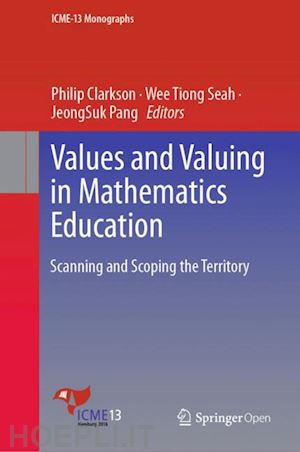
Questo prodotto usufruisce delle SPEDIZIONI GRATIS
selezionando l'opzione Corriere Veloce in fase di ordine.
Pagabile anche con Carta della cultura giovani e del merito, 18App Bonus Cultura e Carta del Docente
Chapter 1
Scanning and Scoping of Values and Valuing in Mathematics Education
Philip Clarkson, Wee Tiong Seah and JeongSuk Pang
1 Introduction
2 Formation of the Book
3 Chapter Outlines
4 Concluding
Chapter 2
Another Conversation with Alan Bishop
Philip C. Clarkson
1 Introduction
2 The ‘original’ Six Values
3 The Interplay of Confidence, Competence and Values
4 Mystery5 Students’ Competence, Choice and Values
6 Final Comments
7 Summary
Chapter 3
Student and/or Teacher Valuing in Mathematics Classrooms: Where are We Now, and Where Should We Go?
Monica Carr
1 Introduction
2 Systematic Search Procedure
3 Results and Discussion
3.1 Where has research been conducted?
3.2 Which stakeholders are represented in the research?
3.3 What is known about the development of values?
3.4 How consistent are the findings reported in the studies?4 Conclusion and Implications
Chapter 4
Values of the Japanese Mathematics Teacher CommunityDouglas Lyman Corey and Hiroyuki Ninomiya
1 Introduction
2 Framework3 Current Study
3.1 Context of the Overarching Study
3.2 Analysis
4 Results
4.1 Emphasizing student mathematical reasoning and thinking in instruction: Behavior
4.2 Emphasizing student mathematical reasoning and thinking in instruction: Values
4.3 Kyozaikenkyu: Behavior
4.4 Kyozaikenkyu: Values4.5 Detailed Lesson-Plan Writing: Behavior
4.6 Detailed Lesson-Plan Writing: Values
4.7 Confirmation Study Results5 Discussion and Conclusion
Chapter 5
Democratic Actions in School Mathematics and the Dilemma of Conflicting Values
Annica Andersson and Lisa Österling
1 Introduction
2 Theoretical Framework
2.1 Mathematical values and democracy
2.2 Students’ democratic participation in mathematics
3 Purpose and Research Questions4 Methodology
4.1 The survey instrument4.2 Survey sample and data collection
4.3 Analysing democratic actions through values behind survey items4.4 Methods of statistical analysis
5 Results5.1 Results for all items
5.2 Items associated with democratic actions
5.3 The most or least valued activities
6 Discussion
Chapter 6
Valuing in Mathematics Learning amongst Ghanaian Students: What Does It Look Like Across Grade Levels?
Ernest Kofi Davis, Monica Carr and Ernest Ampadu
1 Introduction
1.1 Ghana – Location and Pre-Tertiary Mathematics Education
1.2 Values in Mathematics and Mathematics Education
1.3 Values in Mathematics Education across Grade Levels2 The Research Context
2.1 Research Instruments
2.2 Participants2.3 Data Analysis
3 Results
4 Discussion
5 Conclusions and ImplicationsChapter 7
What Do Pasifika Students in New Zealand Value Most for Their Mathematics Learning?
Julia Hill, Jodie Hunter, and Roberta Hunter1 Introduction
2 Pasifika Peoples and Valuing
3 Methodology
4 Findings and Discussion4.1 Utility
4.2 Peer collaboration/group-work
4.3 Effort/practice
4.4 Family/familial support
5. Conclusion and Implications
Chapter 8
The Role of Value Alignment in Levels of Engagement of Mathematics Learning
Penelope Kalogeropoulos and Philip Clarkson
1 Introduction
2 The Four Value Alignment Strategies
2.1 The scaffolding strategy2.2 The balancing strategy
2.3 The intervention strategy
2.4 Refuge strategy
2.5 Classifying the four strategies
2.6 Summary
3 Mathematical Identity and Value Alignment
4 Conclusion
Chapter 9
Exploring Teachers’ Values and Valuing Process in School-Based Lesson Study: A Brunei Darussalam Case Study
Nor Azura Abdullah and Frederick Koon Shing Leung
1 Introduction
2 Methodology3 Results and Discussion
3.1 Intended Value Indicators in Planning Sessions
3.2 Implemented Value Indicators in Teaching Sessions3.3 Attained Value Indicators in the Post-lesson Session
3.4 Summary
4 Conclusion
Chapter 10
Why Mathematics is Valuable for Turkish, Turkish Immigrant and German Students? A Cross - Cultural Study
Yüksel Dede1 Introduction
2 Theoretical Background
2.1 Values and mathematics
2.2 Learning about values through comparative studies
3 Methodology
3.1 Research design3.2 Participants3.3 Semi-structured interviews3.4 Data analysis3.5 Trustworthiness4 Results and Discussion
4.1 Similarities
4.2 Differences
5. Moving On
Chapter 11
Mathematical Values Through Personal and Social Values: A Number Activity in a Japanese KindergartenNagisa Nakawa
1 Introduction
2 MTPPTP Project3 Learning Numbers and Division
4 Values
5 Method
6 Results
7 Discussion
7.1 Cognitive outcome: Children’s activities of dividing two quantities from a logical perspective
7.2 Children’s social and personal values shown through the activity7.3 From social and personal values toward mathematical values
8 Conclusion
Chapter 12
Socially Open-Ended Problems for Enriching Student Learning With Mathematical Models and Social ValuesTakuya Baba and Isao Shimada
1 Historical Background and Research Aim
2 Socially Open-Ended Problems
3 Lesson Using a Socially Open-Ended Problem
3.1 Beginning stage of the lesson3.2 The development stage of the lesson3.3 The summary stage of the lesson4 Discussion
Chapter 13
Values in Mathematics Learning: Perspectives of Chinese Mainland Primary and Secondary Students
Qiaoping Zhang
1 Introduction
2 Previous Research
3 Values Taught in Chinese Mathematics Classroom
4 Research Design and Methodology
5 Results
6 Discussion and Conclusion
Chapter 14
Methodological Issues in the Investigation of Values in Mathematics
Yip-Cheung Chan and Ngai-Ying Wong
1 Theoretical Premises
1.1 Beliefs and values as affective subdomains in mathematics
1.2 The close relationship between beliefs and values










Il sito utilizza cookie ed altri strumenti di tracciamento che raccolgono informazioni dal dispositivo dell’utente. Oltre ai cookie tecnici ed analitici aggregati, strettamente necessari per il funzionamento di questo sito web, previo consenso dell’utente possono essere installati cookie di profilazione e marketing e cookie dei social media. Cliccando su “Accetto tutti i cookie” saranno attivate tutte le categorie di cookie. Per accettare solo deterninate categorie di cookie, cliccare invece su “Impostazioni cookie”. Chiudendo il banner o continuando a navigare saranno installati solo cookie tecnici. Per maggiori dettagli, consultare la Cookie Policy.